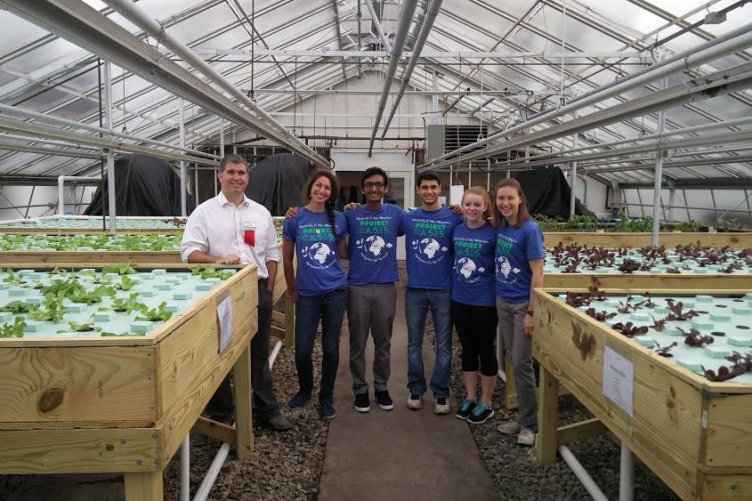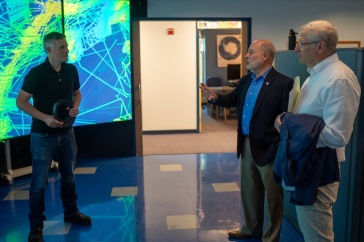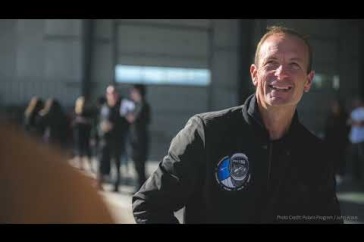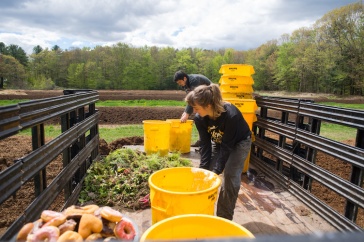
The 2015-16 team represented here includes agricultural engineering professor Todd Guerdat, Mikalah Little '17, Siddharth Nigam '16, Will Taveras '16, Allison Wood '16 and Paige Balcom '16. This summer, Project OASIS was invited to present as part of the International Social Innovation Research Conference (ISIRC) in Glasgow, Scotland. With more than 250 delegates representing more than 30 countries, the conference is considered the leading interdisciplinary social innovation research conference. Both Balcom and Nigam were able to attend to represent the UNH group.
What if something that began as an undergraduate project in the labs and greenhouses of UNH was actually a viable, real-world solution for some of the millions of people who experience food insecurity and malnutrition both here in the U.S. and abroad?
It’s starting to happen.
For Sid Nigam ’16 and Paige Balcom ’16, that’s the goal for Project OASIS, which started as an interdisciplinary, undergraduate capstone project with the goal of designing a sustainable and affordable small-scale aquaponics system.
Project OASIS began when Balcom, Nigam and fellow engineering students wanted to figure out a way to design a system that could help people in developing nations produce food more efficiently than traditional growing methods. The idea was that it would be especially useful in land- or water-scarce urban environments and in rural communities without the means to produce or access food, according to Nigam.
Now, the Project OASIS team is setting their sights on expanding their undergraduate work into a full-fledged startup with commercial applications for a U.S. market.
The idea that people without access to locally farmed food (either because it is too expensive or because they live in urban areas with little access to low-processed food) is something that both Balcom and Nigam are passionate about. Growing up in India, says Nigam, he often saw people struggling for food. “Being able to bring sustainable and affordable methods of food production while at UNH was incredibly meaningful to me. Through OASIS, I have channeled my passion for engineering, international development and entrepreneurship to tackle problems that affect millions of people around the world.”
It was just seven months ago that Nigam and Balcom, along with Will Tavares ’16 and Allison Wood ’16, made their first visit to Uvita, Costa Rica, to lay the groundwork for a sustainable aquaponics system expected to produce fresh vegetables and fish for a community.
While the original goal of Project OASIS was to help people in developing countries, Balcom says that now they have turned their attention to more domestic uses, as well.
What is Aquaponics? Aquaponics agriculture is gaining national and international attention as a new way to farm sustainably. Aquaponics relies on waste produced from farmed fish or other aquatic animals to supply nutrients for plants grown hydroponically, which then, in turn, purify the water. Such a system can successfully provide both seafood as well as plants for communities where traditional farming isn’t reliable or feasible.
The idea of a domestic market first came when three of the students involved received a Summer Seed Grant from the UNH Entrepreneurship Center, to expand their work.
“We wanted to learn about business and find a viable model to fund aquaponics projects in without relying so heavily on grants and donations,” explains Balcom. After participating in an online course to learn about business plans and start-ups, the group thought about funding projects by selling aquaponics systems to American consumers.
They also received some sage advice from Craig Annis ’96, the global vice president of corporate affairs for MARS, Inc., who they met during a New York City regional alumni event in June.
Annis recalls that he was impressed with the students, who introduced themselves during the event and easily struck up a conversation about Project OASIS. And he was intrigued by their work.
“From a food company perspective, that kind of innovation around growing and producing food is fascinating, given the growing trend sustainability, which is something MARS is involved in and that I see our competitors involved in,” says Annis.
In subsequent conversations, Annis connected the students with Seeds of Change, an organic seed and food company owned by Mars, Inc. The company devotes 1 percent of its net sales toward sustainable organic farming initiatives, and, thanks to Annis, they donated seeds to Project OASIS, and connected the UNH team with a community garden in Brooklyn that is interested in aquaponics.
Annis, a political science major who has held jobs in corporate affairs, stakeholder engagement, government affairs, and acquisition strategy, also gave the team advice on how they might turn their school project into a full-fledged startup.
“I gave them my perspective and also proposed some questions for them to think about — what they want to accomplish, how they could commercialize their idea, what direction they wanted to head. For example, are they thinking they want to make a prefabricated kit that people could buy, or are they more linked to their original mission of helping people in need,” Annis explained.
The successful startups that Annis has seen have had a business plan that can accomplish both commercial success and answer the need for social responsibility.
Heeding Good Advice
Annis’ guidance dovetailed with the research that the OASIS team was doing this summer. The group surveyed potential customers and found 60 percent were interested in a home aquaponics system, but they wanted a small, indoor design rather than the large, outdoor system they had developed for Costa Rica as a senior project.
So they redesigned a new aquaponics system specifically for the American consumer. Just under 4 feet, the prototype had an aquarium fish tank on the bottom and plant growing area on the top.
“We designed specially engineered vertical towers to grow lettuce, spinach, Swiss chard, and other leafy vegetables vertically to maximize grow space,” says Nigam. “With special grow lights, customers can grow their plants at maximum productivity year-round. Virtually all the parts are available on Amazon, so we share our OASIS Amazon Wish List with customers and with one click, they can order everything delivered to their door. Then, with our step-by-step manual, customers can easily assemble their home aquaponics garden and learn how to care for their system.”
The entire system would cost less than $450 (while competitors’ models come in around 10 times that much) and would allow a home gardener to grow $644 worth of organic vegetables in a year.
In talks with Balcom and Nigam, Annis also shared his experience as a frequent international traveler and resident — he and his family lived in Belgium for a time, and he’s also travelled extensively throughout Africa, the Middle East, South America and India.
“There’s that saying that all food is local, meaning that people will really only eat what can be sourced locally and what is inherently embedded in their native diets,” he says. He advised Balcom and Nigam to avoid making the mistake that a lot of startups make, which is prescribing certain foods into a local diet that really have no place at all in that area’s food system.
Next Generation of Project OASIS
Project OASIS’s success has been built on students who care about its mission and who bring the engineering skills they are learning in their UNH classes to the project. Nigam says the idea is for it to stay that way, so students can continue to gain real-world problem solving skills while helping others.
Whether they are study engineering, entrepreneurship, sustainable agriculture, biology, or something else, students working for OASIS will be able to apply what they've learned in the classroom and understand how to run a start-up. We believe this new mission and business model will make OASIS a sustainable group at UNH for years to come,” says Nigam.
Where Are They Now?
Paige Balcom received a Fulbright grant to spend nine months in Uganda, studying the technical and cultural feasibility of aquaponics in Uganda by talking with farmers, materials suppliers and government officials. She's working with Makerere and Gulu Universities and ChildVoice International, a Newmarket-based NGO, and planning to build an aquaponic system at ChildVoice. You can read about her work there on her Fulbright in Uganda blog. When she returns to the U.S., she'll start grad school in mechanical engineering at UC Berkeley.
Sid Nigam headed West in August to attend University of Colorado at Boulder. He received full funding to earn his master’s degree, which will focus on computational fluid dynamics for wind power research.
Because both Nigam and Balcom have graduated, they are passing the reins on to current undergraduate students, who will apply their engineering and business smarts to Project OASIS.
Ethan Pirie ’17 worked with them this summer, and Justin Stickney ’17, also a mechanical engineering major, is leading next year's team as they implement their first system in Forjando Alas, Costa Rica, in January and work to make the OASIS home aquaponics garden a reality.
The Future of Project OASIS
This summer, after returning from a trip to Scotland to be part of the prestigious International Social Innovation Research Conference in Glasgow, both Nigam and Balcom said they were excited to see what the future holds for Project OASIS. A year from now, says Balcom, in addition to having the Costa Rica system up and running, the team hopes to have the home concept finalized, a manual crated and a website to market it.
And even though Balcom and Nigam have travelled far from Durham — he’s pursuing a master’s degree in Colorado, and she’s in Uganda on a Fulbright grant for nine months — they both stay connected with the main mission of the project: tackling a global challenge.
“OASIS is so important to me because engineering and international development are my passions, and the work I want to do for the rest of my life,” says Balcom. “My goal is to use engineering to provide people in developing nations with the food, water and power every human deserves. I’m thankful for the opportunity to start doing this as an undergrad at UNH.”
-
Written By:
Michelle Morrissey ’97 | UNH Magazine | michelle.morrissey@unh.edu



















































